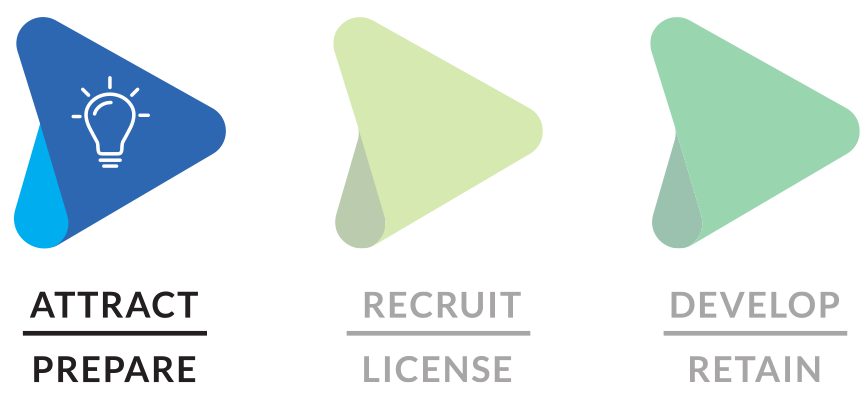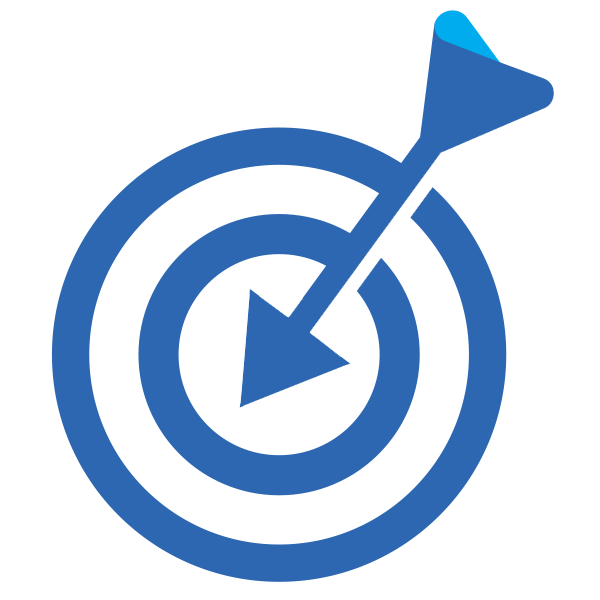
Ensure educators feel prepared to effectively lead classrooms and schools to meet student needs
High-quality preparation matters. It impacts retention, persistence in the profession, and student outcomes. Effective preparation includes coursework, field experiences, and student teaching.
Wisconsin is fortunate to have a large number of preparation programs consisting of two- and four-year institutions of higher education. Cooperative Educational Service Agencies (CESAs), non-profit and for-profit entities, and a school district. All approved programs whether post-baccalaureate or baccalaureate are required to meet the same standards for approval.
Learn what our most recent data sources tell us about EPP programs and the WI education workforce in the WI Educator Preparation Program and Workforce Analysis Report.
 Our Goals
Our Goals
- Grow additional preparation programs in high-need subject areas
- Diversify the workforce
- Prepare additional teachers to meet workforce needs
- Increase connections between schools and preparation programs for additional student teaching and clinical placement opportunities
 Strategies
Strategies
DPI works with educator preparation programs and other state partners to support these strategies.
- Assign each preparation program a DPI staff member to serve as a point of contact and provide support.
- Provide educator preparation programs with data and reviews to support ongoing continuous improvement measures.
- Ensure compliance with state requirements for effective educator preparation.
- Work with stakeholders to ensure educator preparation requirements reflect current research and best practice.
- Provide information on financial resources to remove barriers for prospective educators.
- Survey schools to determine ability to support field placements and clinical experiences.
- Provide high-quality teacher internships.
DPI provides paid internships where prospective teachers complete an internship as their clinical experience while getting paid a stipend. Interns are assigned a cooperating teacher and may work on their own up to half-time through the Wisconsin Improvement Program.
 Ongoing Impact Measures
Ongoing Impact Measures
We continue to review and analyze the impact of these strategies through these sources:
- Enrollment and completion data
- Employment data
- Retention data
- Internship data
- Student outcomes
Financial Assistance Resources
Financial assistance is available from the State of Wisconsin's Higher Educational Aids Board (HEAB) and individual universities. The federal government also provides some loan forgiveness and financial aid programs.
HEAB Programs
- Minority Teacher Loan Program
- Teacher Loan Program
- Teacher of the Visually Impaired
- Dual Enrollment Credential Grant
Directly contact the financial aid office of a college or university for the most current information on available scholarships and grants. One example: UW-Madison offers the Teacher Pledge Program, a loan forgiveness program.
Federal Programs
The Department of Education’s approval of shortage areas in Wisconsin may benefit student grant and loan recipients who are qualified to teach in the academic disciplines, grade levels, and/or geographic regions in Wisconsin where the designated teacher shortages currently occur. Benefits to student financial aid recipients, such as loan cancellations, are indicated in the following regulatory provisions:
- 34 CFR 682.210(b)(5)(ii), (b)(7), (q), and (s) enable a borrower who had no outstanding Federal Family Education Loan (FFEL) Program loan on July 1, 1987, but who had an outstanding FFEL Program loan on July 1, 1993, to qualify for deferment of loan repayment under the Stafford Loan Program anytime within the life of the borrower’s loan(s) for up to three years of service as a full-time teacher in a private elementary or secondary school in a teacher shortage area designated by the Department, and as certified by the chief administrative officer of the particular school in which the borrower is teaching.
- 34 CFR 674.53(c) enables Federal Perkins Loan borrowers who are full-time teachers of mathematics, science, foreign languages, bilingual education, or any other field of expertise where the State educational agency determined there is a shortage of qualified teachers to qualify for cancellation of up to 100% of the outstanding balance on the borrower’s Federal Perkins loans.
- 34 CFR 686.12(d) enables grant recipients to fulfill their teaching obligation under the Teacher Education Assistance for College and Higher Education (TEACH) Grant Program (regarding the requirement to serve at least four academic years, within eight years of graduation) by teaching in a “high-need field,” which includes academic disciplines/subject areas identified as teacher shortage areas at the time the grant recipient begins teaching in that field.
Stafford Loan and Supplemental Loans for Students (SLS) borrowers who have questions concerning their loans, including the teacher shortage area deferment, should contact the Federal Student Aid Hotline at 1-800-4FED-AID and Federal Perkins Loan borrowers should contact the school where they received the loan.
References, Research, Resources, and Reports
Check out sources that drive focus areas and strategies on the Resources and Impact page.